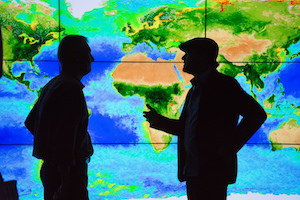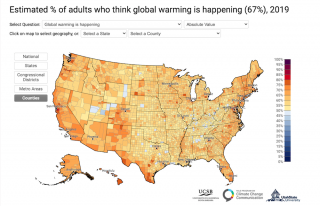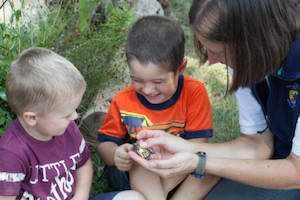These learning resources are provided as a starting point for building fundamental skills needed for engaging the public about climate change as a critical issue affecting public lands and resources. These tools were chosen to give you a basis for further exploration and learning about basic climate science, knowing your audience, and appropriate interpretation techniques.
The estimated completion time for the entire "kit" is 6-8 hours, depending upon your skill level. The segments of the kit may be completed in any sequence.
Knowledge of the Resource
1. Complete the Learning Module on Earth System Science
Climate scientists view Earth as a system of systems. Earth System Science - The Context for Climate will introduce you to the basics of this approach to understanding how our planet works, and help you apply that thinking to your own location and our changing climate. This is foundational for understanding climate change and can be useful for your own learning as well as for your visitors. Plan on about 2 hours to complete. You may start and stop at any time.
2. Take the Climate Change: Fitting the Pieces Together tutorial
This learning module from the University Corporation for Atmospheric Research’s MetEd discusses climate change, particularly as it is currently being affected by increasing concentrations of greenhouse gases emitted by human activities. It also covers signs of climate change, how scientists study climate, the current thinking on future changes, and what can be done to minimize the effects.
3. Interview an Expert

![]() Download this list of prompting questions for use in interviewing a local climate subject matter expert. This important activity will help inform or broaden your understanding of the climate change issues or stories, actual or potential, at your site.
Download this list of prompting questions for use in interviewing a local climate subject matter expert. This important activity will help inform or broaden your understanding of the climate change issues or stories, actual or potential, at your site.
4. Identify at Least One Useful Resource From These Websites
Knowledge of the Audience
Global Warming’s Six Americas
 One of the first rules of effective communication is to “know your audience.” Climate change public communication and engagement efforts must start with the fundamental recognition that people are different and have different psychological, cultural, and political reasons for acting–or not acting–to reduce greenhouse gas emissions.
One of the first rules of effective communication is to “know your audience.” Climate change public communication and engagement efforts must start with the fundamental recognition that people are different and have different psychological, cultural, and political reasons for acting–or not acting–to reduce greenhouse gas emissions.
The Yale Program on Climate Change Communication has conducted many analyses on public opinions about climate change. The first pages of their 2009 foundational study descibe six types of audiences within the American public, each responding to the topic in their own distinct way. The Yale Program has continued to analyze American opions using these "Six Americas."![]() Download and read pages 1-6 of this seminal report.
Download and read pages 1-6 of this seminal report.
Since America's views on climate continue to evolve, it is essential for interpreters to access the most recent information. Up to date analyses including maps (see image, right) that show how climate change beliefs, risk perceptions, and policy support vary at the state, congressional district, metro area, and county levels, are available at http://climatecommunication.yale.edu/about/projects/global-warmings-six-americas/
Appropriate Techniques
1.Take the Foundations of Interpretation On-line Tutorial
If you are new to interpretation this is a great place to start. Whether your communication efforts are targeted at formal or informal learning, this short tutorial (1-2 hours) can help you consider ways to make your communication more meaningful, relevant and engaging for your audiences. Register for this free, National Park Service - developed course at https://www.nps.gov/idp/interp/101/components.htm.
You can also enroll in a free course from IU's Eppley Institute for Parks and Public Lands: Foundations of Interpretation.

OR
Read the NPS Appropriate Techniques and Strategies Guide
![]() This 18-page Guide is a part of NPS' Interpreting Climate Change self study modules. If you are an experienced interpreter, this component of the NPS excellent self study modules may prove especially helpful. Included are techniques and examples of how interpreters are connecting climate change to the main themes of their parks. For a more in-depth treatment of interpretation methodology with respect to climate, you may also be interested in the entire suite of self study modules available here.
This 18-page Guide is a part of NPS' Interpreting Climate Change self study modules. If you are an experienced interpreter, this component of the NPS excellent self study modules may prove especially helpful. Included are techniques and examples of how interpreters are connecting climate change to the main themes of their parks. For a more in-depth treatment of interpretation methodology with respect to climate, you may also be interested in the entire suite of self study modules available here.
2. Communication Strategies for Interpreting Climate Change—Controversy vs. Conflict
![]() Download and read this training handout from the NPS Interpretive Development Program, that provides guidance and encouragement for dealing with a controversial topic.
Download and read this training handout from the NPS Interpretive Development Program, that provides guidance and encouragement for dealing with a controversial topic.
